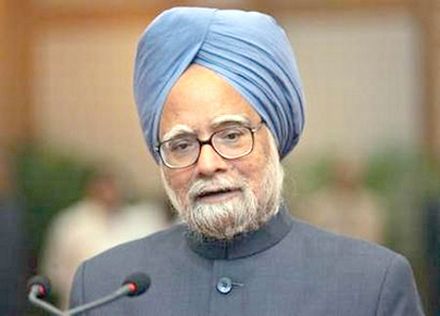India cannot be ruled from Delhi alone: PM
 Prime Minister Manmohan Singh on Friday put the onus of country’s development on the political leadership at the state and local levels obliquely hinting that the future of the country will depend on the progressive qualities of future leadership.
Prime Minister Manmohan Singh on Friday put the onus of country’s development on the political leadership at the state and local levels obliquely hinting that the future of the country will depend on the progressive qualities of future leadership.
“Sitting here in Delhi, we can endlessly debate the qualities of national leadership. But the real change in India will come when we get the right kind of state level and local leadership,” Singh said in his inaugural address at the annual Hindustan Times Leadership Summit.
“No doubt the Union government has an important developmental role, apart from its central role in providing national security. However, with the growth of the market economy and with individual talent and enterprise being unleashed, no agenda for building a new India can any longer be imposed from Delhi,” the Prime Minister said.
Singh underlined the need for thrashing out a consensus across the political spectrum on dealing with the Maoist violence.
“Ours is a functioning democracy. There are occasions of differences of opinion within the coalition. But let there be no doubt that law and order is the priority. We need cooperation of the state governments regardless of their political affiliations,” he said.
Armed with a stronger political mandate in the May's General Elections, Singh extended a hand of friendship to all the neighbours for jointly addressing the challenges of development and security.
“India seeks a neighbourhood of peace and progress. We wish our neighbours well. We would like to see them develop and wipe out poverty and overcome the burden of history,” Singh said.
The prime minister exuded confidence that the UPA government in its second term will be able to able to “push forward” the reforms process.
In response to the question, whether the stalled politically contentious legislations such as opening up of the insurance sector and pushing ahead with labour reforms, Singh said: “We will do so, but it has many dimensions. The focus will be on increasing investment in rural infrastructure and education.”
The Indian economy, that has seen its gross domestic product (GDP) growth rate dip to 6.7 per cent last year from more than 8.85 per cent of growth through 2004 to 2008, should aim for an annual growth rate of 9 to 10 per cent, he said.
Singh said the country was confronted with a set to three broad challenges—sustaining high rates of economic growth, eliminating regional disparities and ensuring economic and social upliftment of the under-privileged sections of society.
Asked whether the prevailing internal situation in Pakistan would encourage the scope for a peace dialogue with India, Singh replied: “Pakistan is grappling with many internal problems. Rise of terrorism is one of them. I wish them success (in combating terrorism),” he said.
“The destinies of the two countries and all others in South Asia are interlinked. It is the job of the visionary leadership in the region to work jointly for elimination of poverty,” he said.
On relations with China, Singh said both the countries have immense opportunities and can grow side by side.
“We have differences on border issues, but peace and tranquility must prevail,” he said.